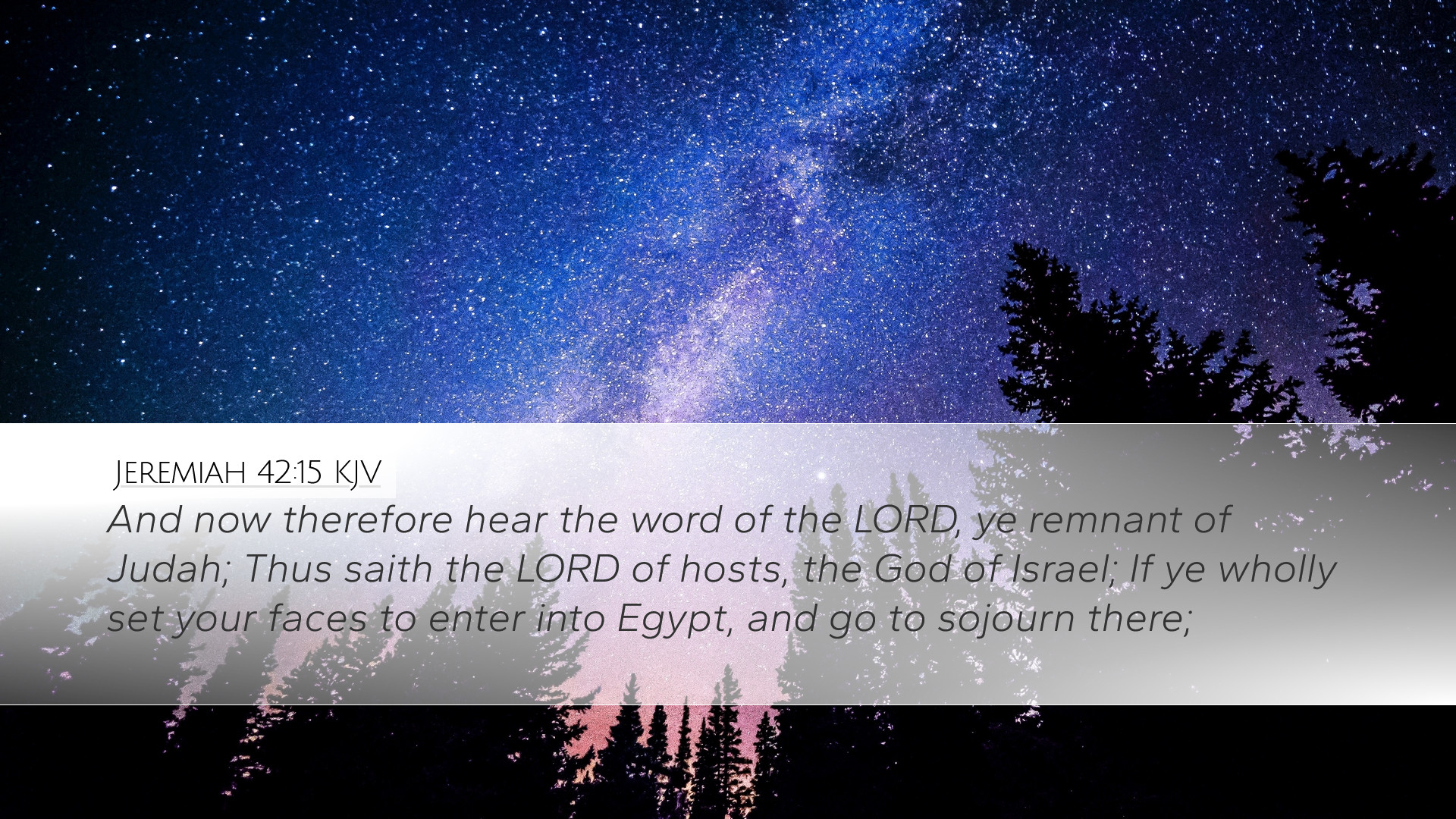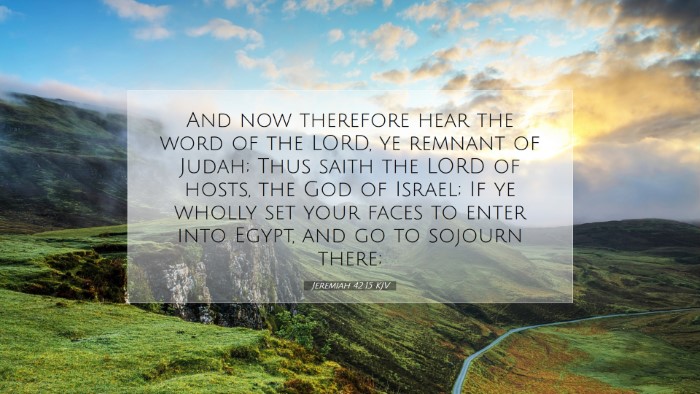Commentary on Jeremiah 42:15
Jeremiah 42:15 states: “And now therefore hear the word of the Lord, you remnant of Judah; Thus says the Lord of hosts, the God of Israel: If you wholly set your faces to enter into Egypt, and go to dwell there;”
Contextual Background
The background of Jeremiah 42 is crucial for understanding the dynamics at play in this passage. After the fall of Jerusalem, a group of Judah's remnant, fearful and uncertain, sought guidance from the prophet Jeremiah regarding their future actions. The socio-political situation was dire, and they were torn between returning to Egypt for safety and facing the new realities of life in Babylon.
Insights from Commentators
Matthew Henry
Matthew Henry emphasizes the plight of the remnant of Judah and their desperation. He notes that, in their request for guidance, the people demonstrate a mix of faith and fear. They want assurance from the Lord but are inclined toward their understanding of safety in Egypt. Henry admonishes that this reflects a common theme of seeking worldly solutions over divine guidance. He highlights how God, through Jeremiah, provides a clear warning against their inclination to flee to Egypt, reminding them of their covenant obligation to remain in the land promised to them.
Albert Barnes
Albert Barnes offers a detailed analysis of God’s message to the remnants. He points out that God’s instruction is about the necessity for obedience over self-preservation. Barnes argues that the remnant’s desire to return to Egypt is a manifestation of their lack of trust in God's providential care. He contextualizes their situation by explaining that Egypt represents a return to slavery and disobedience. Barnes cautions that ignoring God's instruction would bring dire consequences, both spiritually and physically. He emphasizes obedience as the true form of safety, drawing parallels to the Christian call to trust God’s plans despite earthly struggles.
Adam Clarke
Adam Clarke provides a scholarly approach to the passage, stressing the importance of divine counsel. He interprets the verse within the context of prophetic warning. Clarke points out the significance of hearing the word of the Lord, as it is the foundation of faith and wisdom. He warns against the deception of relying on human strategies and fears, urging the remnant—and readers today—to heed the prophetic words that align with God's overarching plan for Israel. Clarke discusses how the remnant's future hinges on their response to God's directive and how divine grace always offers guidance in times of uncertainty.
Theological Significance
This verse encapsulates a critical theological principle regarding the nature of man’s relationship with God. The choice faced by the remnant reflects humanity’s struggle to balance faith, fear, and the desire for self-determination. The warning against fleeing to Egypt serves as a reminder that God desires loyalty and trust, even amidst turmoil. Jeremiah 42:15 thus prompts deep reflection on the nature of God's guidance and the human tendency to seek refuge in familiar but ultimately perilous places.
Practical Applications
- Trust in Divine Guidance: Believers are reminded to seek God’s wisdom in all decisions, especially during difficult times, rather than relying solely on their understanding.
- Obedience Over Safety: The passage underscores the importance of following God’s will, as true safety lies in obedience rather than in avoiding discomfort.
- Awareness of One's Tendencies: It encourages believers to examine their inclinations towards worldly solutions, recognizing that these can lead to spiritual detriment.
- God’s Covenant Faithfulness: The remnant's situation reflects God's enduring covenant, reminding us that His promises are steadfast, urging faithfulness in return.
Conclusion
In summary, Jeremiah 42:15 serves as an important reminder of the complexities of faith amidst fear, the divine assurance available through prophecy, and the need for believers to commit to God’s ways rather than their own fallback plans. Through the insights of various commentators, we see the depth of relational dynamics between humanity and divine providence, calling us to a sincere and obedient walk with God.


